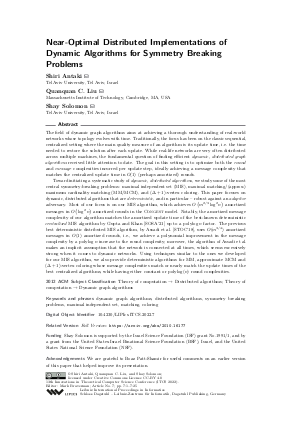@InProceedings{antaki_et_al:LIPIcs.ITCS.2022.7,
author = {Antaki, Shiri and Liu, Quanquan C. and Solomon, Shay},
title = {{Near-Optimal Distributed Implementations of Dynamic Algorithms for Symmetry Breaking Problems}},
booktitle = {13th Innovations in Theoretical Computer Science Conference (ITCS 2022)},
pages = {7:1--7:25},
series = {Leibniz International Proceedings in Informatics (LIPIcs)},
ISBN = {978-3-95977-217-4},
ISSN = {1868-8969},
year = {2022},
volume = {215},
editor = {Braverman, Mark},
publisher = {Schloss Dagstuhl -- Leibniz-Zentrum f{\"u}r Informatik},
address = {Dagstuhl, Germany},
URL = {https://drops.dagstuhl.de/entities/document/10.4230/LIPIcs.ITCS.2022.7},
URN = {urn:nbn:de:0030-drops-156039},
doi = {10.4230/LIPIcs.ITCS.2022.7},
annote = {Keywords: dynamic graph algorithms, distributed algorithms, symmetry breaking problems, maximal independent set, matching, coloring}
}

 Creative Commons Attribution 4.0 International license
Creative Commons Attribution 4.0 International license



















